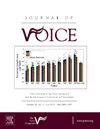Feasibility and Preliminary Efficacy of Two Technology-assisted Vocal Interventions for Older Adults Living in a Residential Facility
IF 2.4
4区 医学
Q1 AUDIOLOGY & SPEECH-LANGUAGE PATHOLOGY
引用次数: 0
Abstract
Objectives/Hypothesis
An increasing number of older adults are seeking behavioral voice therapy to manage their voice problems. Poor adherence to voice therapy is a known problem across all treatment-seeking populations. Given age-related physical and cognitive impairments and multiple chronic conditions, older adults are more susceptible to low adherence to behavioral therapies. The purpose of this study was to test the feasibility of an at-home, vocal training intervention for older adults without a known voice disorder living in a senior living community, as well as compare the effects of two modes of mobile health (mHealth) technology-assisted vocal training targeting vocal function and adherence in older adults.
Study Design
Parallel Group – Randomized Trial.
Methods
Twenty-three individuals were recruited from a single residential retirement community and randomly allocated into two experimental groups. Both groups were asked to practice the Vocal Function Exercises with increasing frequency over an 8-week period. Tablets with instructions for performing the exercises were provided to all participants. The feedback group's tablets also contained an application providing real-time feedback on pitch, loudness, and duration. Acoustic and aerodynamic measures of vocal function and cognitive measures were obtained before and after the intervention. Self-reported measures of practice frequency, perceived vocal progress and changes, and motivation were obtained weekly.
Results
The feedback control group adhered to the requested practice sessions more in the latter half of the intervention (weeks 5 and 8). Vocal function measures remained stable. Overall, a pattern reflecting self-reported vocal progress and a general improvement in working memory and global cognitive functioning was observed in the feedback group.
Conclusions
This study demonstrated that an 8-week mHealth intervention is viable to facilitate vocal practice in older adults. Although vocal ability did not improve with training, results indicated that vocal performance remained stable and age-related vocal changes did not progress. Future research on implementation of mHealth applications in conjunction with behavioral voice therapy is warranted to assess adherence and improvements in vocal function in individuals with age-related voice problems.
为居住在养老院的老年人提供两种技术辅助发声干预的可行性和初步效果。
目标/假设:越来越多的老年人寻求行为嗓音治疗来解决嗓音问题。在所有寻求治疗的人群中,嗓音治疗依从性差是一个众所周知的问题。考虑到与年龄有关的身体和认知障碍以及多种慢性疾病,老年人更容易出现行为疗法依从性低的问题。本研究的目的是测试为居住在老年生活社区、没有已知嗓音障碍的老年人提供居家发声训练干预的可行性,并比较两种移动医疗(mHealth)技术辅助发声训练模式对老年人发声功能和坚持性的影响:研究设计:队列研究(前瞻性观察研究):从一个退休住宅社区招募 23 人,随机分配到两个实验组。两组均被要求在 8 周内增加声乐功能练习的频率。所有参与者都获得了附有练习说明的平板电脑。反馈组的平板电脑还包含一个应用程序,提供关于音高、响度和持续时间的实时反馈。在干预前后,对发声功能进行了声学和空气动力学测量,并进行了认知测量。每周对练习频率、感知到的声乐进步和变化以及动机进行自我报告测量:结果:在干预的后半期(第 5 周和第 8 周),反馈控制组坚持练习的次数更多。声乐功能指标保持稳定。总体而言,反馈组的模式反映了自我声乐进步以及工作记忆和整体认知功能的普遍改善:这项研究表明,为期 8 周的移动保健干预措施对促进老年人的声乐练习是可行的。虽然发声能力并没有随着训练而提高,但结果表明,发声表现保持稳定,与年龄相关的发声变化并没有加剧。未来有必要对移动医疗应用与行为嗓音疗法的结合实施情况进行研究,以评估与年龄相关的嗓音问题患者的坚持性和嗓音功能的改善情况。
本文章由计算机程序翻译,如有差异,请以英文原文为准。
求助全文
约1分钟内获得全文
求助全文
来源期刊

Journal of Voice
医学-耳鼻喉科学
CiteScore
4.00
自引率
13.60%
发文量
395
审稿时长
59 days
期刊介绍:
The Journal of Voice is widely regarded as the world''s premiere journal for voice medicine and research. This peer-reviewed publication is listed in Index Medicus and is indexed by the Institute for Scientific Information. The journal contains articles written by experts throughout the world on all topics in voice sciences, voice medicine and surgery, and speech-language pathologists'' management of voice-related problems. The journal includes clinical articles, clinical research, and laboratory research. Members of the Foundation receive the journal as a benefit of membership.
 求助内容:
求助内容: 应助结果提醒方式:
应助结果提醒方式:


